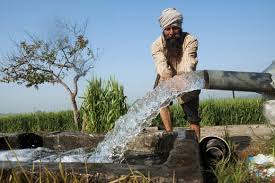Climate change and its implications for punjab's economy
Climate change and its implications for Punjab's economy
**Climate Change Punjab is an agricultural state located in northern India. The state's economy relies heavily on agriculture, which accounts for about 25% of its GDP. Climate change threatens to disrupt Punjab's agriculture and have disastrous consequences for the state's economy.
Here are some of the implications of climate change for Punjab's economy:
Decline in agricultural production: Climate change is already causing a decline in agricultural production in Punjab. Rising temperatures, changing rainfall patterns, and increasing frequency of extreme weather events are affecting crops. For example, the production of rice, which is a staple crop in Punjab, has already decreased due to heat stress.
Water scarcity: Punjab is a water-stressed region, and climate change is exacerbating the problem. Rising temperatures are leading to increased evaporation, while changing rainfall patterns are leading to decreased water availability. This is already affecting agriculture and other sectors of the economy.
Increased risk of natural disasters: Climate change is increasing the frequency and intensity of natural disasters such as floods, droughts, and heat waves. These disasters can cause significant damage to agriculture, infrastructure, and other sectors of the economy.
Impacts on health: Climate change is also impacting human health in Punjab. Rising temperatures and increasing air pollution are leading to an increase in respiratory diseases, cardiovascular diseases, and other health problems. This is putting additional pressure on the health system and reducing productivity.
The government of Punjab is taking steps to mitigate the effects of climate change on the state's economy. These steps include:
Promoting sustainable agricultural practices:The government is promoting sustainable agricultural practices such as drip irrigation, zero tillage, and crop diversification. These practices can help to reduce greenhouse gas emissions, conserve water, and improve agricultural productivity.
Investing in irrigation infrastructure: The government is investing in irrigation infrastructure to improve water availability for agriculture. This includes building new dams, canals, and irrigation systems.
Promoting renewable energy:The government is promoting the use of renewable energy sources such as solar and wind power. This can help to reduce the state's reliance on fossil fuels and reduce greenhouse gas emissions.
Strengthening disaster preparedness: The government is strengthening disaster preparedness to reduce the impact of natural disasters on the economy. This includes improving early warning systems, building disaster shelters, and training communities in disaster preparedness.
Climate change is a serious threat to the economy of Punjab. However, by taking steps to mitigate the effects of climate change, the government of Punjab can help to protect the state's economy and ensure a sustainable future for its people.



.jpg)
Comments
Post a Comment